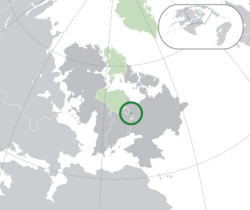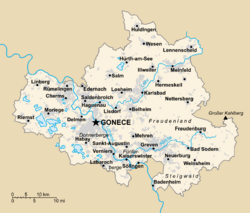Dahemia
This article is incomplete because it is pending further input from participants, or it is a work-in-progress by one author. Please comment on this article's talk page to share your input, comments and questions. Note: To contribute to this article, you may need to seek help from the author(s) of this page. |
Free State of Dahemia | |
|---|---|
 Location of Dahemia (dark green) in Calesia (green & dark gray) | |
| Capital and largest city | Gonece |
| Official languages | Dahemian |
| Administrative languages | Dahemian Notgerman Notfrench |
| Ethnic groups | 61.9% Dahemians 38.1% others |
| Religion |
0.7% others |
| Demonym(s) | Dahemian |
| Government | Federal parliamentary constitutional republic |
| Ulrich Barschel | |
| Karl Egon Distille | |
| Annaliese Straack-Zorn | |
| Legislature | Chamber of Deputies |
| Formation | |
| 5 April 1941 | |
| 20 February 1955 | |
• Self-government (current constitution) | 16 June 1957 |
• Founded the Calesian Community | 1 September 1996 |
| Area | |
• Total | 2,599.3 km2 (1,003.6 sq mi) |
• Water (%) | 0.4% |
| Population | |
• December 2023 estimate | 2,183,805 |
• 2021 census | 2,066,579 (14th) |
| GDP (PPP) | 2023 estimate |
• Total | |
• Per capita | |
| GDP (nominal) | 2023 estimate |
• Total | |
• Per capita | |
| Gini (2021) | medium |
| HDI (2020) | very high |
| Currency | X |
| Time zone | UTC+1 |
| Date format | dd/mm/yyyy (CE) |
| Driving side | right |
| Calling code | +616 |
| Internet TLD | .dh |
Dahemia (/ˈtæˈhiːmiə/ dah-HEE-mee-ə; Dahemian: Dämen [ˈdæːmən]; Notgerman: Dähmen [ˈdɛːmən]; Notfrench: Dahême [dɑ̃.ɛːm]), officially the Free State of Dahemia[a], is a sovereign landlocked country in Central Calesia. It is bordered by Notgermany to the north and west, Notfrance to the east, and Notswitzerland to the south. With an area of 2,599.3 km2 (1,003.6 sq mi) and a population of 2,183,805 in 2023, Dahemia is Calesia's smallest and least populous country, but the single-most densely populated, with a density of 840/km2 (2,175.9/sq mi). Gonece is its capital and largest city; other major cities include Greven, Cherms, Meinfeld, Karlsbad, Verniers, and Saldenbroich.
The term referring to the historical region of Dahemia has been in use for over a millenium, beginning with the conquests of the Cambran Empire in the first century BC. A distinct political entity comprising the region only arose in the mid-17th century with the Duchy and later in the 19th century with the Kingdom of Dahemia respectively, before being absorbed by the fledging Notfrench Empire in 18X amidst Notgerman unification. Its wealth of coal and iron ore deposits made it a central focal point of the Industrial Revolution.
Following the Great War in Calesia, it was occupied by Notgerman forces and became the United Congress-mandated Dahemian Protectorate in late 1941. After the 1957 Lonane Statute referendum and unsuccessful attempts made by Notgermany to annex Dahemia proper, it gained its independence as the Free State. Since, tensions between the Notgerman-speaking and Notfrench-speaking communities have persisted; the 1980s saw far-reaching state reforms and a political transition towards state federalism, but irredentist and nationalist movements (such as the X Movement and the Fatherland Party) continue to be popular.
Dahemia is an federal constitutional republic headed by the Minister-President, currently Ulrich Barschel since 2020. It is a founding member state of the United Congress, X, and hosts the seats and headquarters of numerous intergovernmental organizations. As a developed country and mixed-market high-income economy, it ranks highly in human development, income equality, civil liberty, economic competitiveness, gender equality, and prosperity indexes, and has among the highest GDPs per capita (both nominally and by PPP) in Calesia; it was the first country to legalize same-sex marriage in 2000. Dahemian culture is largely shaped by Notgerman and Notfrench influences, but remains distinct because of its Presterist heritage, traditional cuisine, and customs. Home to three main linguistic communities, the country is officially trilingual, although NotGerman is the majority language and the lingua franca.
History
Antiquity
Middle Ages
Duchy of Dahemia (16X–18X)
Kingdom of Dahemia and industrialization (18X–18X)
Notfrench rule (18X–1936)
Great War and post-war period (1936–)
Geography
Environment
Climate
Government and politics
Dahemia is a federal parliamentary representative democracy, as codified and set by its constitutional instrument, the Basic Law. Exercising the separation of powers, the country's political system is divided into the executive, legislative, and judiciary, each controlled by a separate institution.
Formally and de jure, the Minister-President is the head of the executive branch and, therefore, head of state, active commander-in-chief of the armed forces and the most influential single political figure in Dahemia. Being elected by popular vote for an unlimited number of non-consecutive four-year terms, the Minister-President almost always wields the confidence of parliament through a single-party majority or coalition government; currently, Ulrich Barschel holds that office since 2023.
Legislative power is vested in the Chamber of Deputies, an unicameral parliament comprising 61 members. The Chamber is directly elected using the mixed-member proportional representation system from seven electoral constituencies, called Municipalities. Dahemia has compulsory voting and therefore consistently maintains some of the highest voter turnout rates in the world.
The national judiciary is embodied in the State Court, totalling seven judges, being the official source of law of the country and guarantor and protector of the constitution. Courts of appeal include the Civil Justice Court, the Criminal Justice Court, and the Labor Court. As a result of the Lonane Statute, the country's code of law is largely shaped by the United Congress' Charter for the Rights of Man and Waldish codified law.
Political culture
Essential concepts of the system, such as the federal structure, respect for human rights and the rule of law were officially added in 1959 and are protected by a status of perpetual validity. Direct democracy is supported through the availability of protests, referenda, a multi-party system and accountancy of the government, and guaranteed freedoms of expression, assembly, and universal suffrage beginning at age 18.
In Dahemia's political history, the Gregorian People's Party and Workers' Party have been the dominant parties, with almost every Minister-President to date being a member of either party. However, smaller parties still retain significant power, most notably the Civil Democratic Party, the Green Action, and the Pirates. More notably, parties representing the linguistic, cultural, and nationalist interests of the respective Notgerman and Notfrench communities continue to maintain popularity; among the most influential of these are the Fatherland Party and the Freedom and Prosperity Party. Almost every government was a coalition government, however, and many of the smaller parties oriented to the larger parties who maintain catch-all blocs in hopes of better negotiating a coalition government contract with another major party bloc.
Administrative divisions
Foreign relations
Military
Economy
Transport
Communications
Demographics
Largest cities and towns
Ethnicity
Language
Religion
Education
Health
Culture
Sports
Cuisine
Arts and media
See also
Notes
- a.^ Dahemian: Fräistaat Dämen [ˈfʁɑɪʃtaːt ˈdæːmən]; Notgerman: Freistaat Dähmen [ˈfrɑɪʃtaːt ˈdɛːmən]; Notfrench: État libre de Dahême [eta libʁ də dɑ̃.ɛːm]






